As I went to Google I / O and came back alive (almost)
Conferences are large, small, thematic and not so, but in general, each of them lives according to its own laws. It is logical that in order to understand them (laws), you must attend the conference in person. Today I would like to talk about what Google I / O is, how everything is arranged there and what I understood when I was in the heart of Google.
Of course, the information in the network is complete, but I do not pretend to be unique. Do you think of seven thousand people, I alone was worthy of writing a post on Habré? Let the funnel and narrows, as the resource is Russian-speaking (for now), but nevertheless our brother was full there, and even more so Google accredits a whole pool of journalists for its events. Anyway, everyone sees an elephant from the different side, and I will try to outline what part I saw. By the way, I have some kind of experience: both the speaker and the organizer (a moment of naked advertising by the WrikeTechClub - regular meetings on various topics and HolyJS - one of the best frontend conferences).
Attention, this is not a detailed analysis of the program, but a purely subjective opinion of the conference participant. All recordings are available on YouTube , including the recap version, so I see no reason to retell the material word for word, this is not a technical review.
')
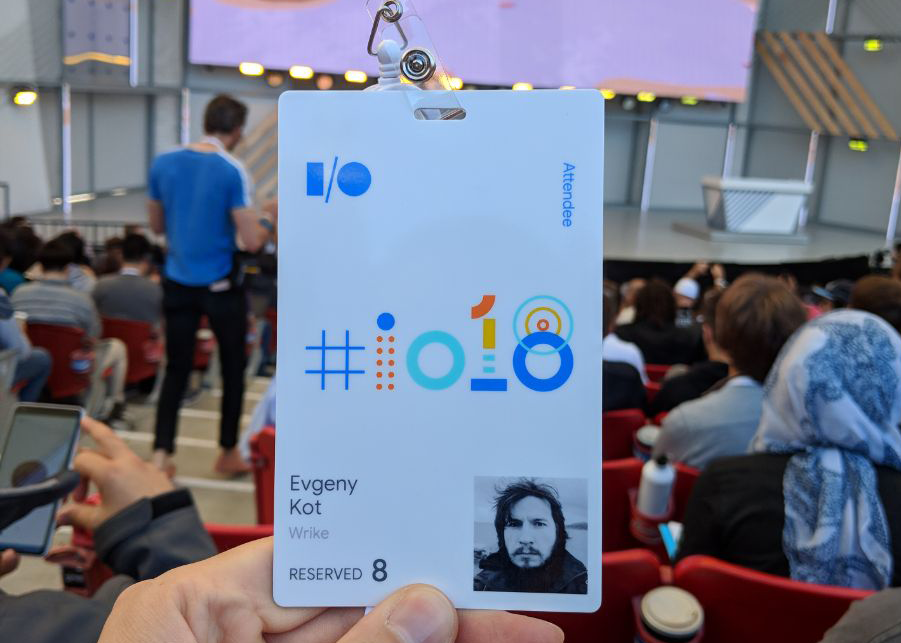
Elementary! Just buy a conference ticket for $ 1200, a plane ticket to San Francisco ($ 1000) and book a hotel for three days (another $ 1000). Communication is priceless, for the rest there is Visa tm . Of course, the amount is rather big, even if you work somewhere in the “valley”, and, like all developers, swim in luxury. However, there are several ways to not pay that kind of money, or to pay significantly less:
At this, your expenses basically end, you have a ticket, you have a place to live, and you flew to San José and ... Here, by the way, a small lyrical digression:
From my own experience I want to say that organizing something even for a hundred people, like at our meetings in the WrikeTechClub, is not such an easy task. Logistics, playground, registration, tickets - all this takes a lot of energy. And I think that Google has a dedicated team doing it all. What is the result? As a result, of course, that wonderful spirit of razdolbaystva disappears, that romance “AAA, EVERYTHING HAS LOST!”, These wonderful moments when someone writes in a chat: “raw meat is at lunch” I have no offense, on the contrary, well done). Everything is clear and strict. Everywhere, people are wearing special T-shirts that tell you what to do, where to go and where not to go. For example, about registration:
Having a ticket in your email, you must receive a badge to enter the territory. So, registration opened at seven in the morning, and there were already people there! And some were from four in the morning on an empty parking lot to be the first! This is not a joke, I personally know such a person. The point is that the first opening keynote, on which the main news is usually announced, takes place directly in the amphitheater. And he, of course, cannot accommodate everyone, those who do not have enough space are forced to sit on the grass. It sounds not so scary, but in addition to the grass there is a California sun. And not all of us live in cities where there is summer in general (for example, Peter was the sun that year, but I was sick that day). Therefore, to get a place closer to the scene under a canopy, you must come before everyone else and take a turn. So in the country of victorious capitalism, people stand as if for sausage. But, by the way, everything is polite; at night the police are offering to sit in the car, to warm up.
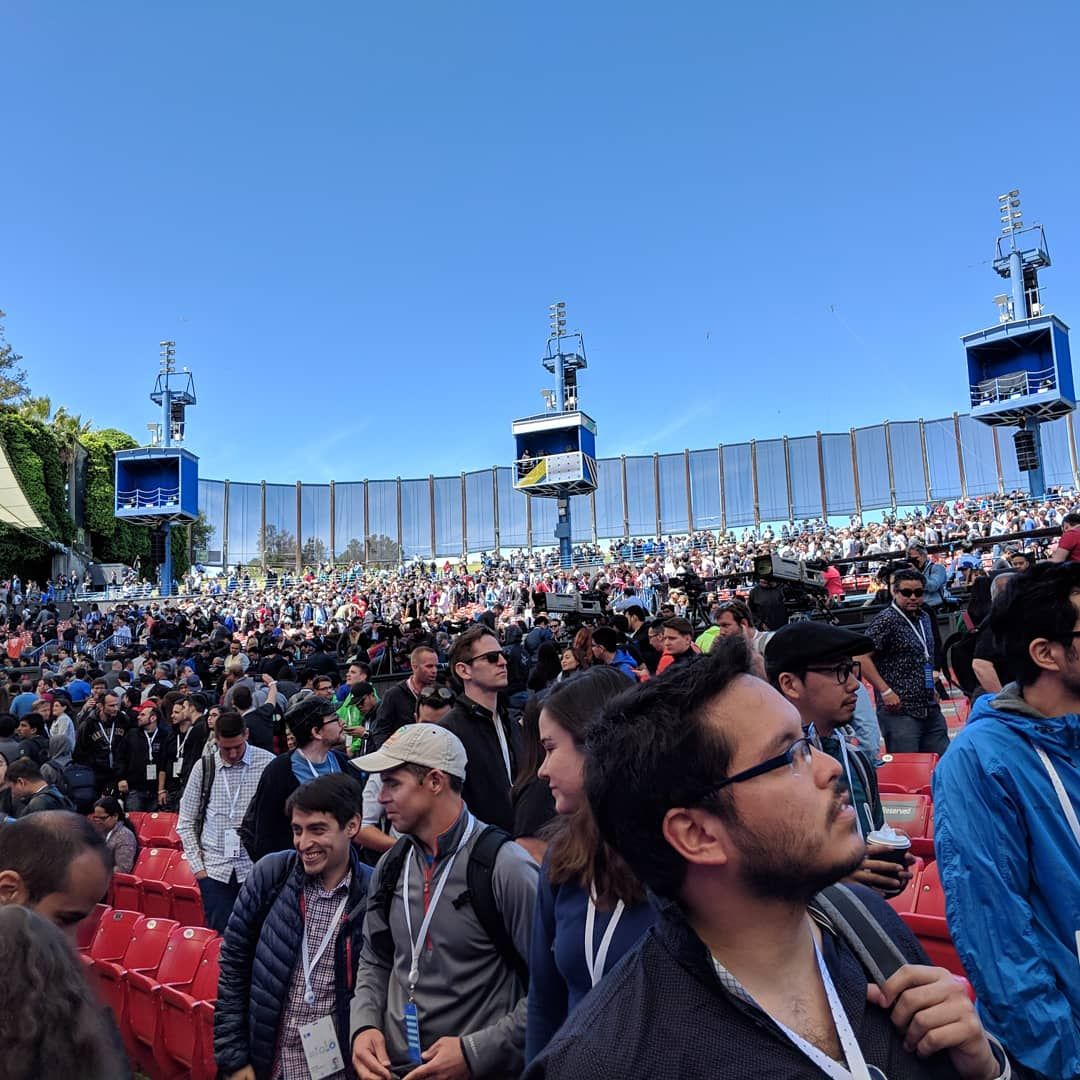
People listened to keynote and move for lunch
But everything is not so bad, there is a special application (unfortunately, written not on Flutter ), in which you could mark those reports where you want to go and book a place for yourself. Therefore, there were two queues for each site: Registered and Stand By.
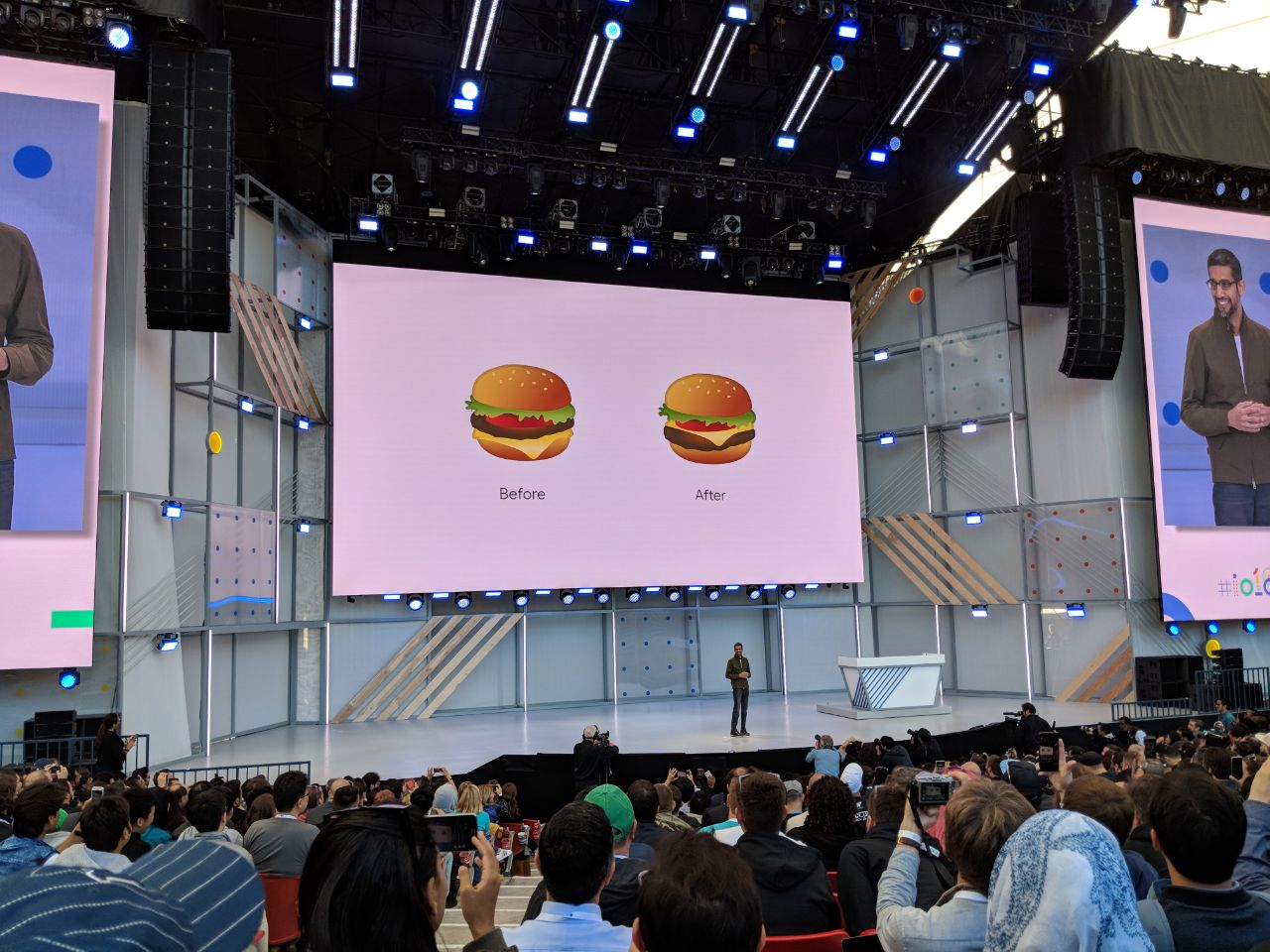
The opening report told how emoji was repaired
A little about food and entertainment: in principle, they fed normally, I was not fussy, once a day you could take a box of sandwich or salad, apples, chips and cookies.
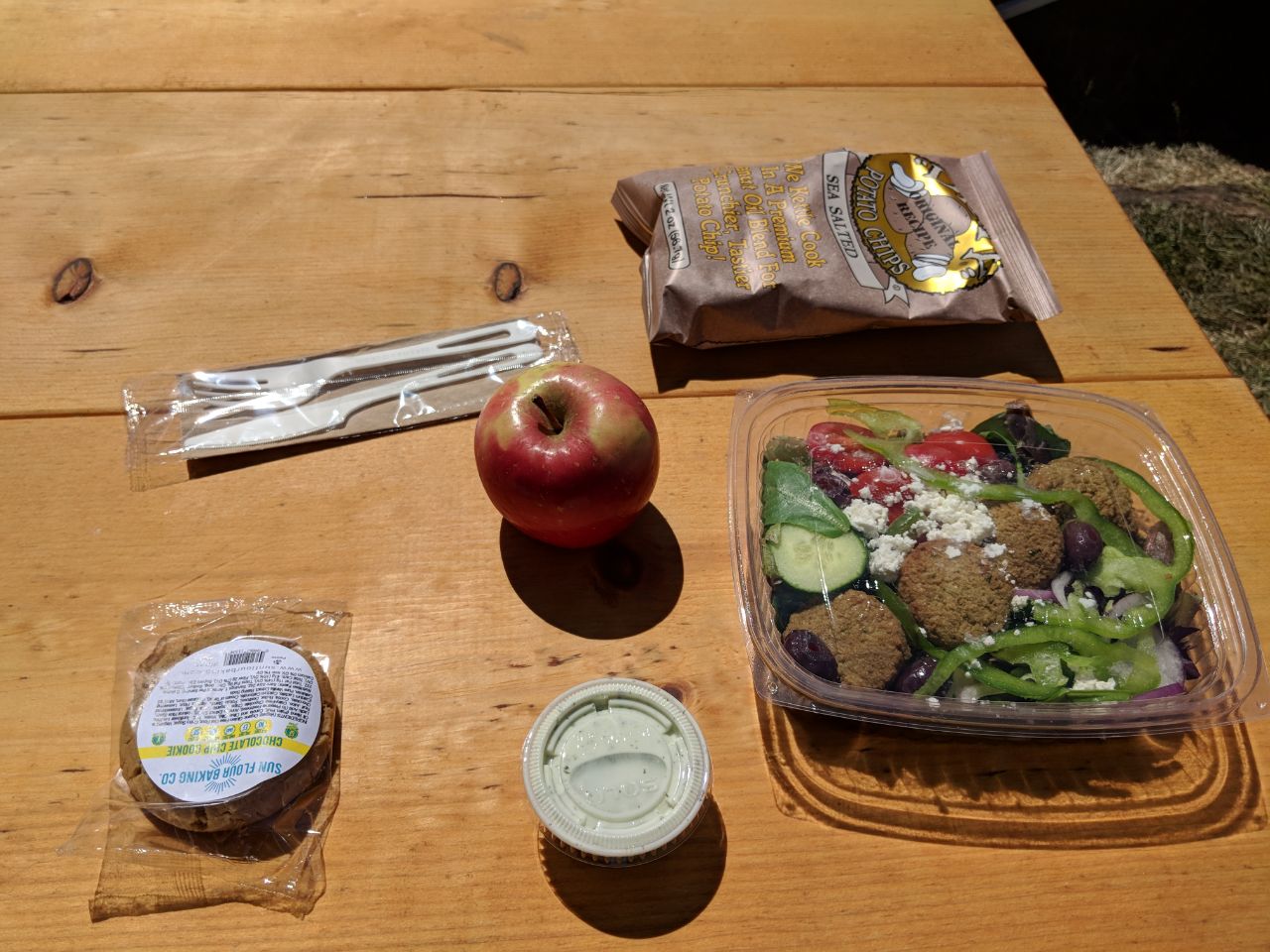
Such a lunch
Those who were few - points with snacks were scattered across the territory, sometimes quite strange. For example, salted cucumber in the package. Moreover, cucumbers were of two types: father (ordinary salting) and mother (acute salting). Such is the diversity. I do not like the way, the consistency is not the same. I did not want to drink vodka, but some kind of bourbon.
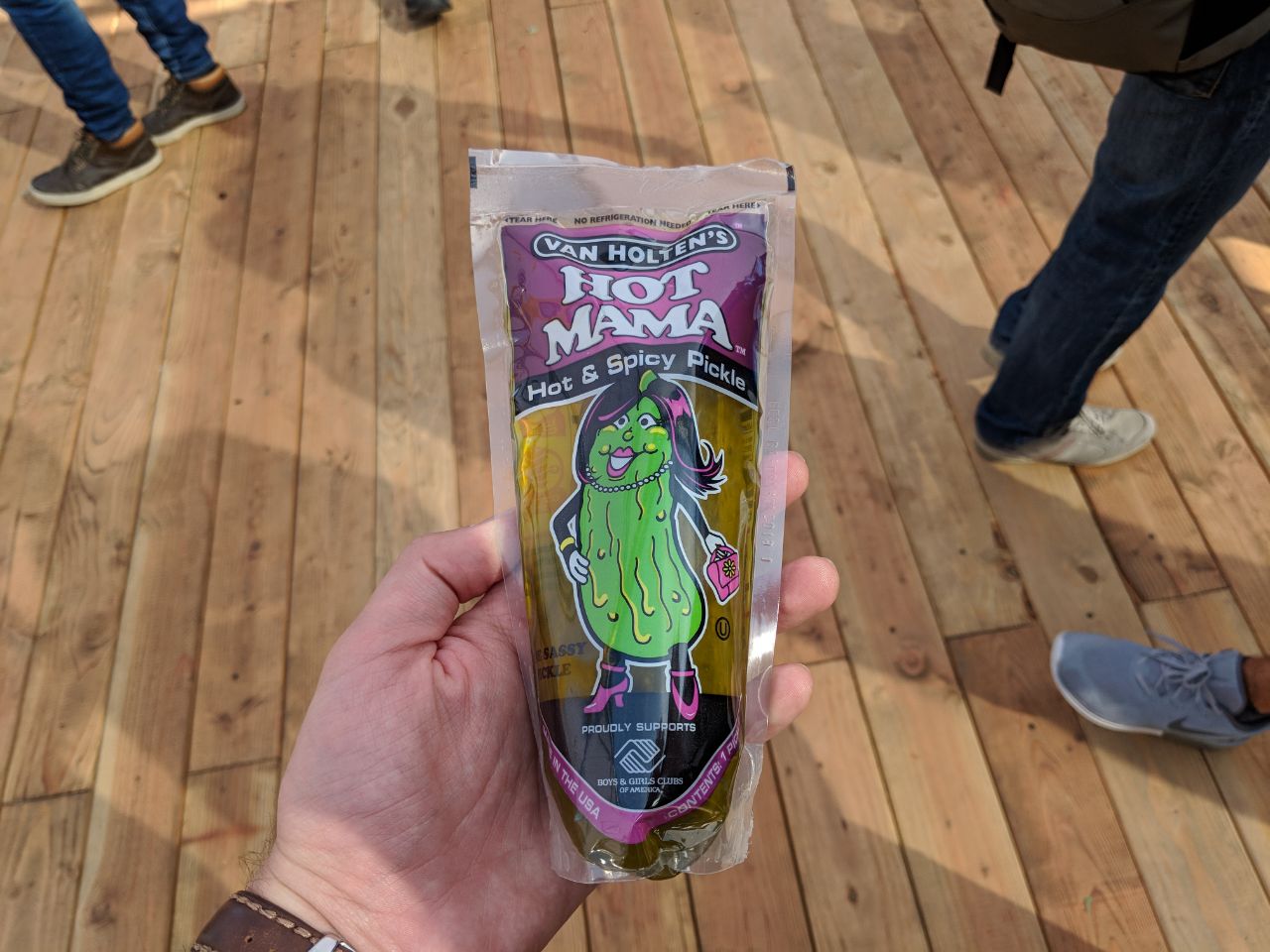
They say dad tasted better
About entertainment: in general, everything that happened at the conference could be divided into four types: interesting , boring , I already know / I do not need it, and game! . The evening program mostly fell into the latter category.
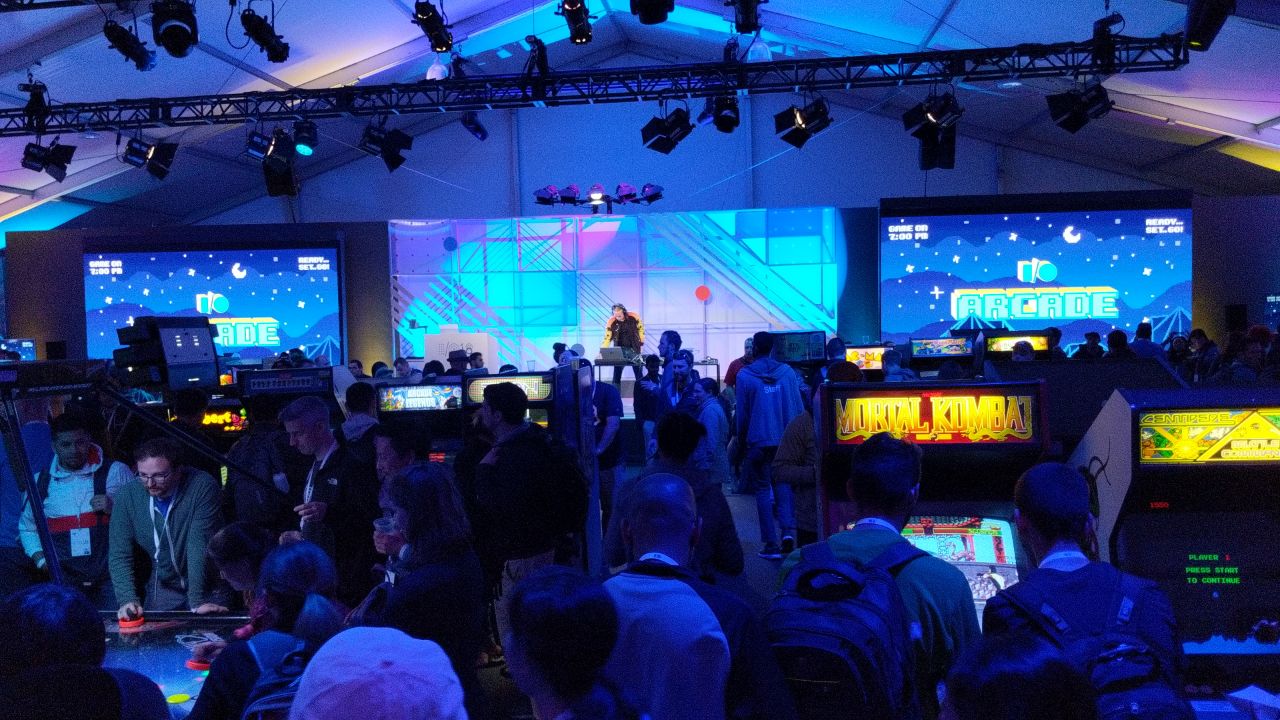
Sintvave and slot machines
Now a little about the program itself. Here I don’t want to go deep, firstly I’m too lazy to give transcripts of all the reports, they are all available on YouTube , and secondly, there was so much press that all the news from the reports were probably already spread out on a million articles. As I said, everything that happened on I / O was divided into several categories:
The big problem, as Jake Archibald aptly noted, was that with an amazing variety of speakers (of all races, genders, positions in a company, etc.) they were all reduced to something average. As a person who saw a lot of reports and coached the speakers, I seemed to be eating a cucumber. Only without salt. Have you ever eaten a fresh cucumber just like that, without salt? It's disgusting. No, I do not say that the speakers performed poorly - it is clear that they trained, worried, but it was all very averaged, curtailed. There was a feeling (and, most likely, it was so), as if they were reading from the breather. Nevertheless, thanks to all the speakers (as if they are reading this, yeah), I appreciate their work.
The main direction of development of Google is artificial intelligence, and everything connected with it. The company tries to use machine learning, neural networks and other technologies as much as possible and often, choosing the main idea “AI to help people”. From the examples can be identified
You can continue further, it was shown a large number of other examples, through which the AI thread passes through the red thread. Including the acclaimed (and by the way, creep) Google Duplex, which calls shops and speaks to employees in a human voice. What to say to this is quite logical that Google uses the tools and opportunities that it has. If I had such a sample, I would probably do the same.
Regarding the Web (in which I understand more), there were several announcements, not that very loud, but nonetheless:
In general, there was one problem in all the reports: as the cartoon character said, “not enough”. Those. at the seemingly big technical conference there were not very many serious technical reports. And I understand why - such specificity. Too many people, too different levels. In fact, all (or most) of the reports were “survey”, calculated for the general public. Therefore, if you already somehow touched the described technologies - well, you would not discover anything new for yourself.

Hana you, bags of meat
Developer Keynote : Kotlin rode through Kotlin ... Artificial intelligence for everyone (aha, many people lack their own), for the Web - Polymer 3.0, Lighthouse 3.0, custom Material, cool!
Almost everything about the Web on the first day : PWA PWA PWA PWA PWA PWA PWA PWA PWA PWA PWA PWA PWA

PWA PWA PWA
Flutter : damn, why did I come, I know that.
Evening : oh, Paul Irish tomorrow morning will tell about the new features of DevTools, cool! Now, just go to the store, buy beer

All shelves are inundated with IPA
Lord, I wish I died, a report about DevTools at 8:30! Damn IPA
I died.
Web Performance : Oh God, Addy Osmani, Alive! I sit quietly in the hall, do not chase me, please.
In addition to jokes, see the reports, there are a lot of new things to debug.
The Future of the web : Um, where's the dart?
Polymer 3.0 : well, it is. Well, like the rules, but damn. We already have a lot of game.
WebAssembly : * your Internet is unnecessary * How GC will be screwed - then we'll talk
What's new in Angular : Uh, where's the dart?
Android KTX (extension Kotlin) : well, everything, soon Kotlin will turn into JavaScript. As in the pie:
Ivan for everything is taken boldly
Everything turns into javascript ...
But seriously - once again - go to YouTube and see, there were a lot of cool reports.
If we sum up the results of the program, especially the part that interested me (and everything interested me, one way or another related to Dart), now high hopes are pinned on Flutter. Yes, I know that the biggest chauvinists are not white privileged men, but native mobile developers, but seriously - look at Flutter more closely, he is very cool. Talking on the sidelines confirms this. As for Dart - of course, I did not hear direct references in the reports, only through Flutter, but with quiet sly, I hope the language itself will become better, and the developers will increase. By the way, did I already tell you that we have comfortable chat rooms in Russian?
Telegram Dart Russia
Slack
Do not miss the chance to visit the Google Plex, the whole office complex, located near the site. You can get there by bike
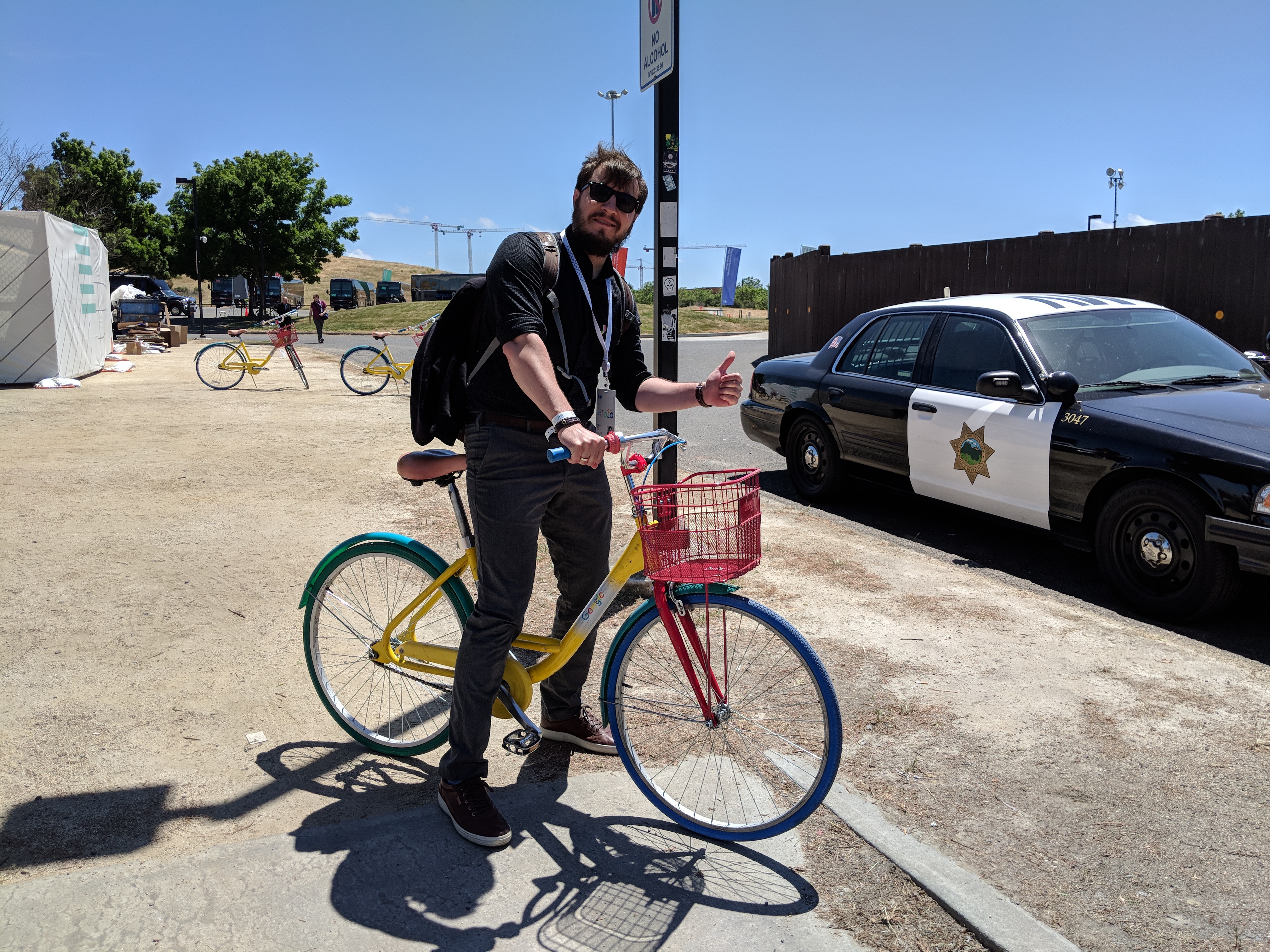
Bicycles of characteristic color are scattered throughout. You can ride them for free
You can see there the garden with the “Androids”. Every year, Google installs on its territory a statue in honor of the current version of the operating system. As soon as a new one appears, the old one is written off to the reserve for the mercy of tourists.

android gingerbread
It is also interesting to look at the offices where the "world intellectual elite" works. Of course, they won't let you inside, but you can stand in the hall.
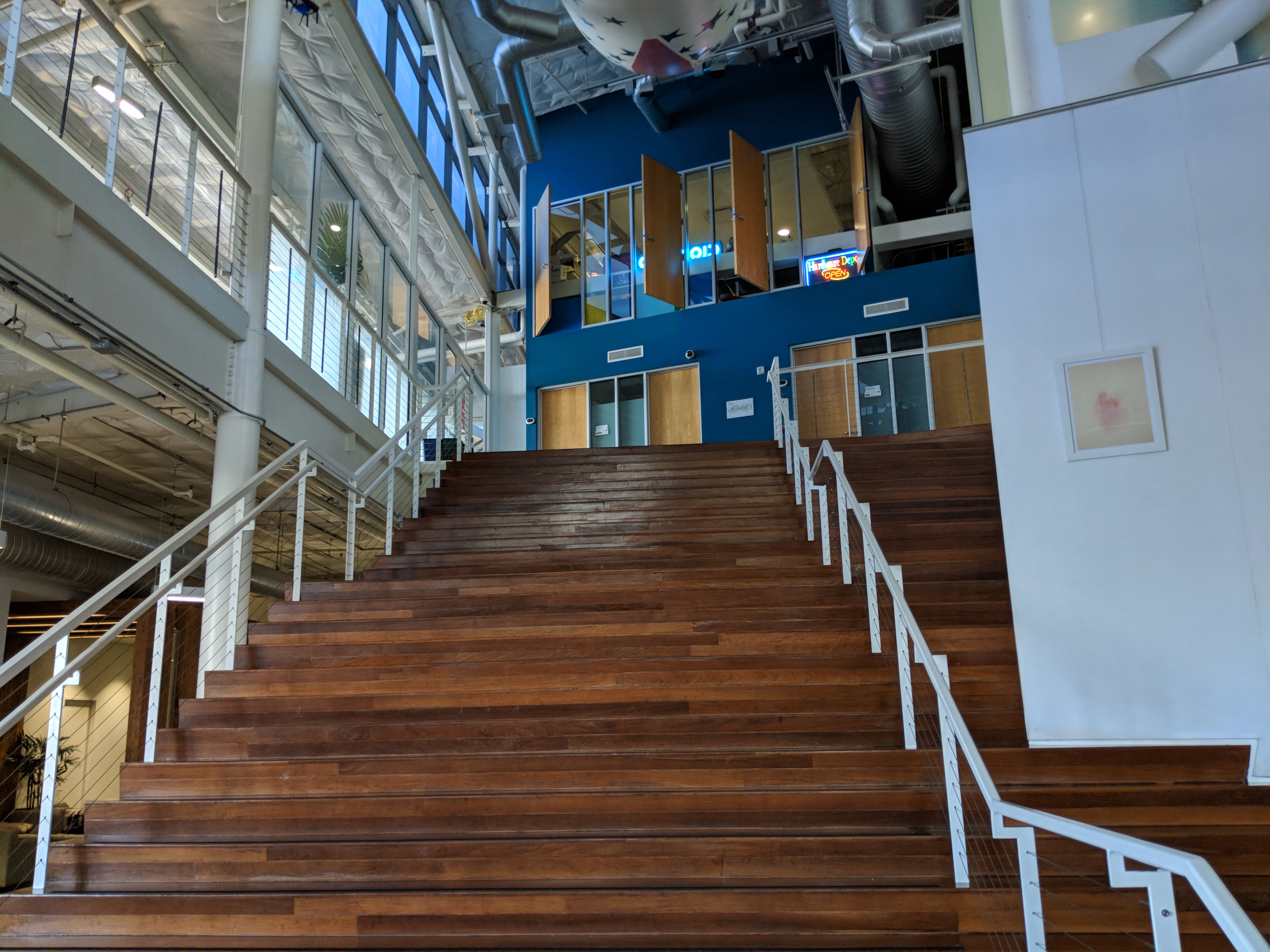
Above the stairs hangs a spent shuttle.
In addition, the territory has a lot of interesting things:
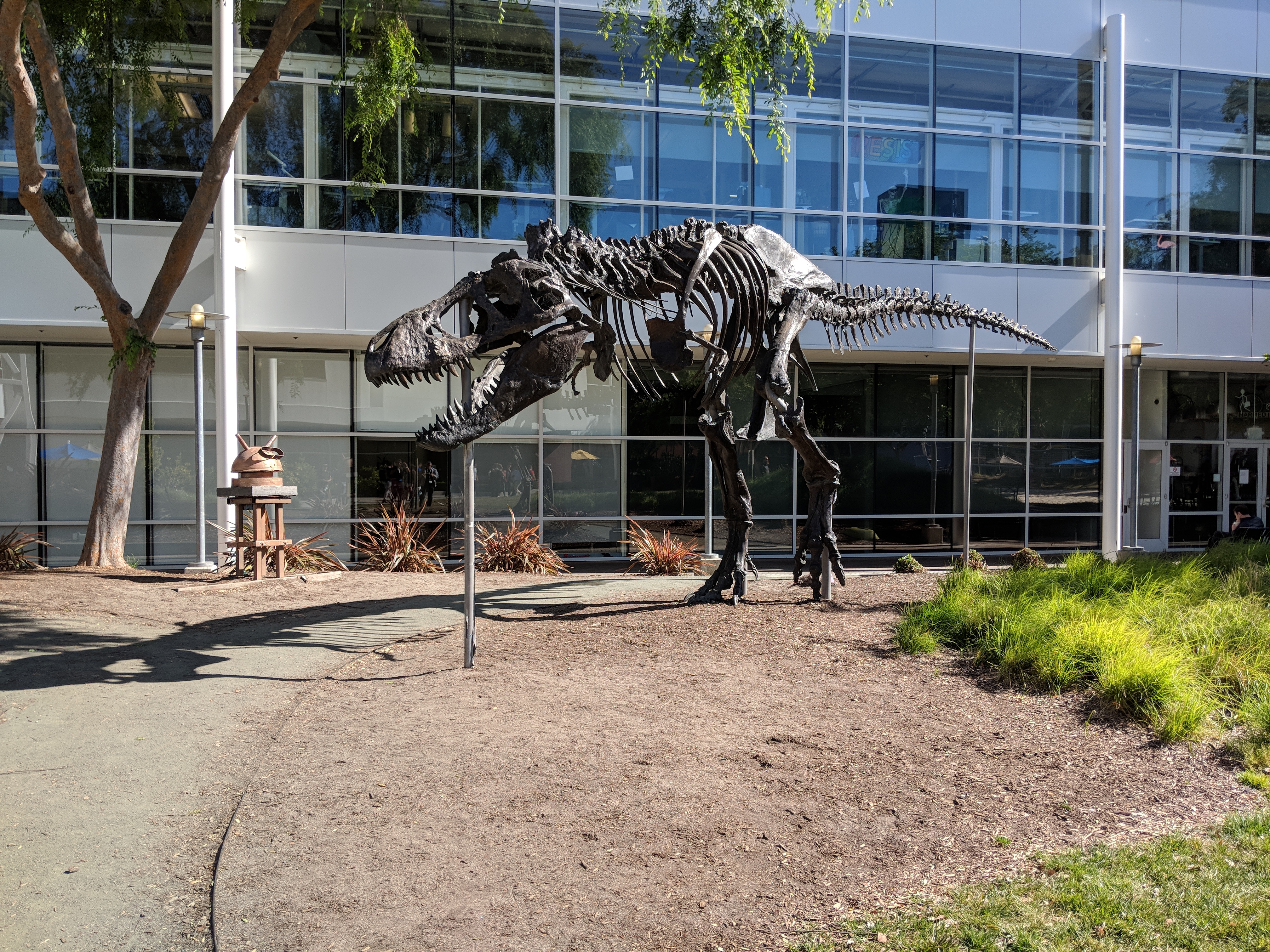
This is what you see in Chrome when there is no connection. Well, or his younger brother
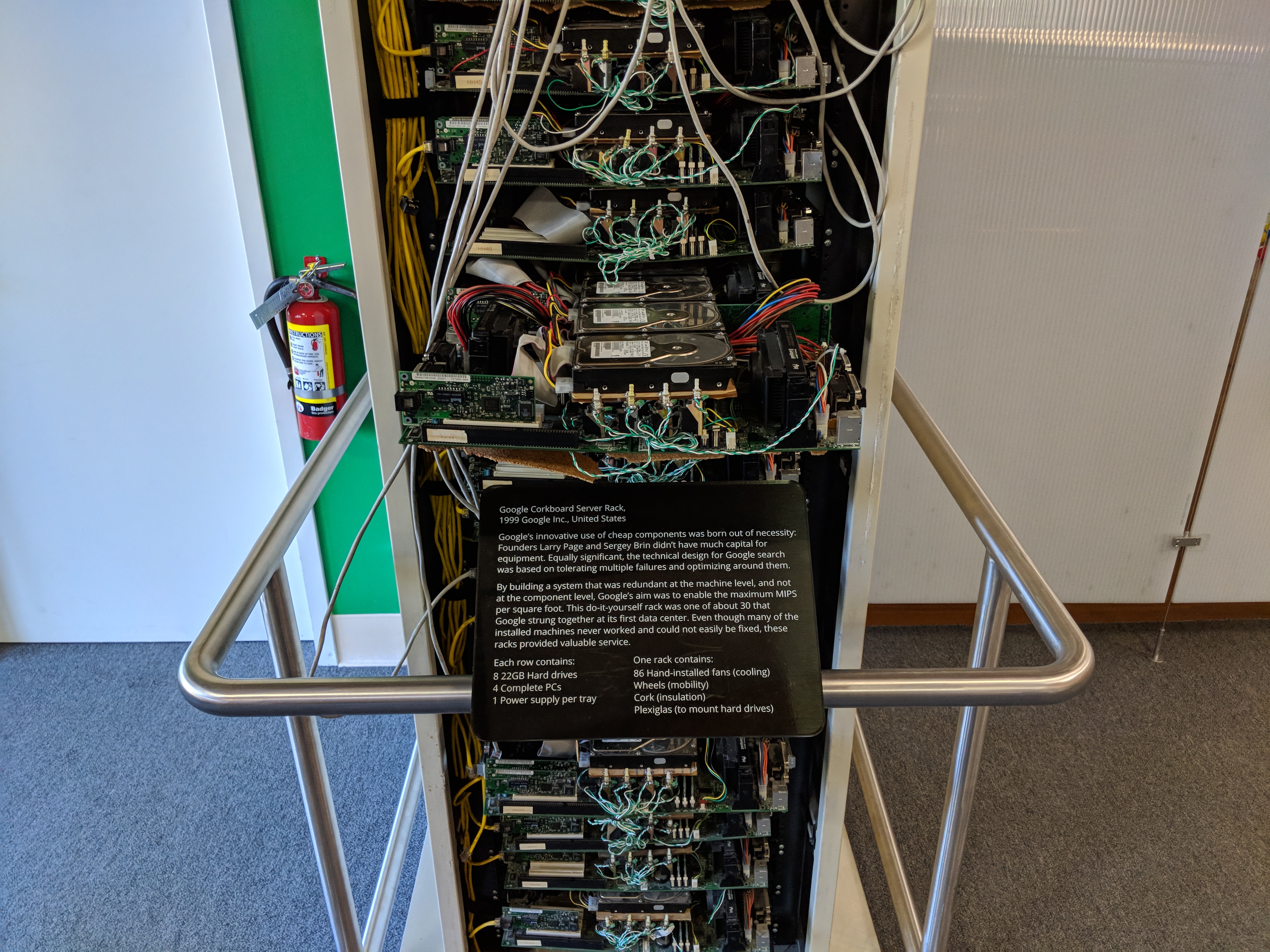
Google worked on these servers in the 90s. This one was personally collected by Bryn and Paige
Should I go? How is the conference as a whole? To answer this question is definitely difficult. Let me give you a checklist, and you will put "yes" or "no", and if "yes" will be more, then go
About networking. That's what really matters. If you come alone and do not communicate with anyone - then what for to shuffle that far and pay so much money? You can watch the broadcast. The whole point of I / O, and of other conferences is to meet like-minded people, maybe find new friends or at least meet someone. We are all with you - the neurons of one huge IT brain. If we do not create new connections, we will close in the same thoughts and decisions, technologies and patterns.
This is really very helpful, inspiring, and just fun to ask Google’s “why does Chrome suck” and hear a completely honest answer, have a beer with a guy from India and find out that he also uses Dart, catch on with some completely stranger and sit together to debug his code.
So if you answer the question, did I like the conference, then I would say yes. I met a huge number of cool, enthusiastic, intelligent, cheerful people, and, as it seems to me, I myself became a little smarter, happier and cooler.
Thanks for attention!
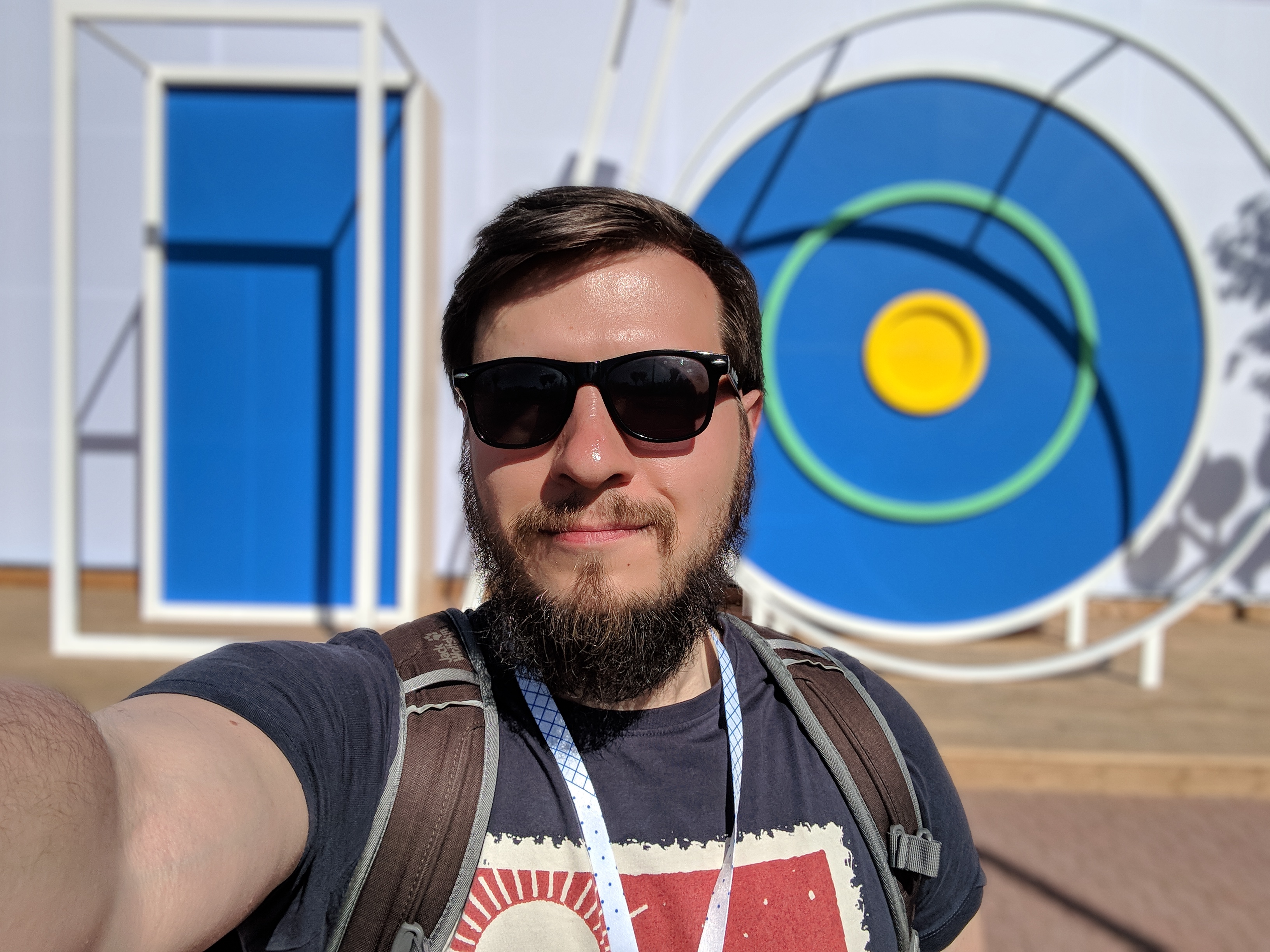
PS I would like to say hello and say thanks to everyone I met and spoke with. There are so many of them that I will surely forget someone, so I will not write by name, otherwise they will be offended. By the way, if you have read this, then you are my hero, I have been writing this on an airplane for five hours in a row, and my eyes are flowing. And yes, if you read it, then I definitely returned alive.
Of course, the information in the network is complete, but I do not pretend to be unique. Do you think of seven thousand people, I alone was worthy of writing a post on Habré? Let the funnel and narrows, as the resource is Russian-speaking (for now), but nevertheless our brother was full there, and even more so Google accredits a whole pool of journalists for its events. Anyway, everyone sees an elephant from the different side, and I will try to outline what part I saw. By the way, I have some kind of experience: both the speaker and the organizer (a moment of naked advertising by the WrikeTechClub - regular meetings on various topics and HolyJS - one of the best frontend conferences).
Attention, this is not a detailed analysis of the program, but a purely subjective opinion of the conference participant. All recordings are available on YouTube , including the recap version, so I see no reason to retell the material word for word, this is not a technical review.
')

For a start, how to get on Google I / O?
Elementary! Just buy a conference ticket for $ 1200, a plane ticket to San Francisco ($ 1000) and book a hotel for three days (another $ 1000). Communication is priceless, for the rest there is Visa tm . Of course, the amount is rather big, even if you work somewhere in the “valley”, and, like all developers, swim in luxury. However, there are several ways to not pay that kind of money, or to pay significantly less:
- advance booking will help reduce the price of the aircraft. Well, it's stupid to give advice here, everyone knows a million air ticket aggregators
- hotel. Of course, a variety of hostels and "kamorkingi", of which is full throughout the Mountain View, San Jose and nearby cities. In general, Silicon Valley has long been turned into Sochi, only instead of holidaymakers who are ready to sleep on the floor "if only it is cheaper", then IT people of all stripes who came to conquer the dream. Life here is extremely expensive, but they don’t take everyone to Google - so you have to save. So it is quite possible to rent a bed not so expensive. Well, there is always the opportunity to live somewhere far away and go to the conference by transport. However, I do not advise very far to move away - because of the schedule (see below). And, oddly enough, AirBnB can be quite helpful. You can find a good offer and rent a whole house for 15 people, and it will be cheaper than a hotel or hostel. True, it is fraught with health (because every night is booze), but it’s beneficial.
- ticket to the conference itself is not necessary to buy! In general, Google has a very developed developer support program: various GDG , GDE and other programs. In the end, if you have done something useful for the community, and at the same time do not belong to any of these associations - you can still get a ticket for free. At the same time, there are a lot of such tickets, so activity of any kind, let it not bring direct money, but it works like karma: first you - then you. As the saying goes: “first, you have been working on the record book for three years, then the record book works for you”. If it became interesting, let me introduce the one-of-a-kind zviad - Google DevRel in our region. Why only? And because it is the only one to such huge Russia, Ukraine, Belarus and neighboring countries. I want to add that unfortunate, but if you scribble him a few lines about how you want to help the development of developer associations, I think he will not be upset ;-)
At this, your expenses basically end, you have a ticket, you have a place to live, and you flew to San José and ... Here, by the way, a small lyrical digression:
At Pulkovo Airport, while waiting for my flight, I met colleagues in the workshop, who, it turns out, also flew I / O. Having been delighted that I would not fly alone, I started telling them to sit down together, and it turns out that the flight is different! Tsimes stories that they arrive an hour earlier in San Jose, and I later in San Francisco. And from there to go, for a moment, something about two hours, if by public transport. I don’t know what, apparently, some kind of clouding has found on me, but it turned out how it went ¯ \ _ (ツ) _ / ¯. So advice: take a ticket to San Jose, if you can, otherwise you will have to go to CalTrain (such as an electric train). And if you are late (like me, of course), then please, wait an hour, or take a taxi ($ 60). I took a taxi, for me money is like paper (no).Well, you have arrived, everything is fine, and here it is, the first day of the conference. You want to quickly go and listen to the most important report from Sundar Pichai (CEO of Google), but first about the organization.
Organization
From my own experience I want to say that organizing something even for a hundred people, like at our meetings in the WrikeTechClub, is not such an easy task. Logistics, playground, registration, tickets - all this takes a lot of energy. And I think that Google has a dedicated team doing it all. What is the result? As a result, of course, that wonderful spirit of razdolbaystva disappears, that romance “AAA, EVERYTHING HAS LOST!”, These wonderful moments when someone writes in a chat: “raw meat is at lunch” I have no offense, on the contrary, well done). Everything is clear and strict. Everywhere, people are wearing special T-shirts that tell you what to do, where to go and where not to go. For example, about registration:
Having a ticket in your email, you must receive a badge to enter the territory. So, registration opened at seven in the morning, and there were already people there! And some were from four in the morning on an empty parking lot to be the first! This is not a joke, I personally know such a person. The point is that the first opening keynote, on which the main news is usually announced, takes place directly in the amphitheater. And he, of course, cannot accommodate everyone, those who do not have enough space are forced to sit on the grass. It sounds not so scary, but in addition to the grass there is a California sun. And not all of us live in cities where there is summer in general (for example, Peter was the sun that year, but I was sick that day). Therefore, to get a place closer to the scene under a canopy, you must come before everyone else and take a turn. So in the country of victorious capitalism, people stand as if for sausage. But, by the way, everything is polite; at night the police are offering to sit in the car, to warm up.
Why I came back almost alive: the California sun turned out to be very rough to the tender Petersburg noses, and in an hour it was possible to get burnt to the skin. The organizers wisely put sunscreen in a merchandise package, but who uses it? ..Having received a badge, you pass to the territory (of course, after standing a little longer), and you see that the circus has arrived. Naturally, Shoreline Amphitheatre looks like a huge circus dome, around which various awnings, tents and tents are piled up - Google products are presented in them and give a smaller presentation. And around the huge crowds. For you to understand - there were about nine scenes on the stage, and each of them had to stand in line.

People listened to keynote and move for lunch
But everything is not so bad, there is a special application (unfortunately, written not on Flutter ), in which you could mark those reports where you want to go and book a place for yourself. Therefore, there were two queues for each site: Registered and Stand By.
A little about the schedule: the first day started at 10:00, but if you wanted to grab something from food, drink coffee, get a badge or take a closer look, you should have come much in advance, the queue at the entrance stretched for hundreds of meters. The second day was no better - the first report started at 8:30! Considering the queues, traffic jams, the first-day after-party and the general condition - it was completely inhuman, I think.

The opening report told how emoji was repaired
A little about food and entertainment: in principle, they fed normally, I was not fussy, once a day you could take a box of sandwich or salad, apples, chips and cookies.

Such a lunch
Those who were few - points with snacks were scattered across the territory, sometimes quite strange. For example, salted cucumber in the package. Moreover, cucumbers were of two types: father (ordinary salting) and mother (acute salting). Such is the diversity. I do not like the way, the consistency is not the same. I did not want to drink vodka, but some kind of bourbon.

They say dad tasted better
About entertainment: in general, everything that happened at the conference could be divided into four types: interesting , boring , I already know / I do not need it, and game! . The evening program mostly fell into the latter category.
Again, from experience, to do something other than “well, in short, we bought beer and pizza, have fun” is not very easy. We, when we come up with what to do on the afterparty, we cross out a lot of everything. “So, dwarf bears on scooters are expensive. Karaoke - all the blood will flow from the ears, what to do ... ".In the case of I / O, the question of price is certainly not worth it, but creativity is needed. In general, it was not bad: dances, invited groups, music of all stripes, a game room, where dj played synthwave, and a whole lot more. Well, beer, of course. However, I have a tooth for American beer - well, I don’t really like IPA, and there all the shelves are inundated with it. So, I would probably take the category “FAMILY!” To be only a magic show, in which some dancing girls were the only ones from magic. Now, if they had cut the JS developer in half and the lower one would have done the backend on Node, and the upper one would type it ... (:: THINKING FACE :)

Sintvave and slot machines
Now a little about the program itself. Here I don’t want to go deep, firstly I’m too lazy to give transcripts of all the reports, they are all available on YouTube , and secondly, there was so much press that all the news from the reports were probably already spread out on a million articles. As I said, everything that happened on I / O was divided into several categories:
- interesting. Well, of course, opening keyout, you still feel a certain thrill when the CEO of one of the most powerful corporations looks at you from the scene. Take and ban you for no reason - who cares. Also a number of reports that I got (see below).
- is boring. Since I am nevertheless closer to the world of the web (read: stupid to master Java), many of the reports were not very interesting to me. Not because I did not understand anything (see further), but simply the subject area is not mine.
- already know. Since we have been writing to Dart for a long time, everything connected with it is no longer a novelty for us. In the case of Flutter , for example, I did not hear anything super-burst.
- I do not need. There was a lot of activity from the category: show your attachment to google and ask why it does not work. It wasn’t very interesting to me, it’s already full of googles in our attachment, heh.
So the program
The big problem, as Jake Archibald aptly noted, was that with an amazing variety of speakers (of all races, genders, positions in a company, etc.) they were all reduced to something average. As a person who saw a lot of reports and coached the speakers, I seemed to be eating a cucumber. Only without salt. Have you ever eaten a fresh cucumber just like that, without salt? It's disgusting. No, I do not say that the speakers performed poorly - it is clear that they trained, worried, but it was all very averaged, curtailed. There was a feeling (and, most likely, it was so), as if they were reading from the breather. Nevertheless, thanks to all the speakers (as if they are reading this, yeah), I appreciate their work.
The main direction of development of Google is artificial intelligence, and everything connected with it. The company tries to use machine learning, neural networks and other technologies as much as possible and often, choosing the main idea “AI to help people”. From the examples can be identified
- Gmail smart compose. Offers phrases based on context, such IntelliSense, but for natural languages. Will be otllen in this month.
- Google lens - based on machine learning, offers to immediately make a photo better (remove the background, make it brighter, etc.). Of the interesting innovations can be noted the opportunity to take a document and it will be recognized and converted into a pdf!
- Google News - the new version will again use AI to filter the issue and determine those news that is relevant for you.
You can continue further, it was shown a large number of other examples, through which the AI thread passes through the red thread. Including the acclaimed (and by the way, creep) Google Duplex, which calls shops and speaks to employees in a human voice. What to say to this is quite logical that Google uses the tools and opportunities that it has. If I had such a sample, I would probably do the same.
Regarding the Web (in which I understand more), there were several announcements, not that very loud, but nonetheless:
- Lighthouse 3. The empowerment profiler, which allows you to understand how good your site
- material theme. Google is often blamed for the fact that Material Design is a bit ... monotonous. All applications as a carbon copy. The corporation, apparently, heeded the voice of users and now it became possible to add their own themes and redraw the design for themselves
- pwa. A lot was said about progressive applications, but in fact, nothing really was said (see below)
- web assembly. Same
- Angular. Here I will recommend reading what appeared in the sixth version, I will not retell.
In general, there was one problem in all the reports: as the cartoon character said, “not enough”. Those. at the seemingly big technical conference there were not very many serious technical reports. And I understand why - such specificity. Too many people, too different levels. In fact, all (or most) of the reports were “survey”, calculated for the general public. Therefore, if you already somehow touched the described technologies - well, you would not discover anything new for yourself.
Well, a little about the reports.
Sorry that the narration is a bit discontinuous, I want all this text to be perceived as nothing more than friendly notes on the cuffs. Yes, and I can not tell me structurallyOpening keyout : cool animated screensaver, and overall the slides are nice. I wonder what makes presentations for such things? Is it really Google Slides? About content: Wow, fixed Emodji. Wow, new features in Google Photos, Wow, new voices in the assistant, Wow, Google will call for you in the mage ... Wait, what kind of game? So, can I have an iPhone, please.

Hana you, bags of meat
Developer Keynote : Kotlin rode through Kotlin ... Artificial intelligence for everyone (aha, many people lack their own), for the Web - Polymer 3.0, Lighthouse 3.0, custom Material, cool!
Almost everything about the Web on the first day : PWA PWA PWA PWA PWA PWA PWA PWA PWA PWA PWA PWA PWA

PWA PWA PWA
Flutter : damn, why did I come, I know that.
Evening : oh, Paul Irish tomorrow morning will tell about the new features of DevTools, cool! Now, just go to the store, buy beer

All shelves are inundated with IPA
Second day:
Lord, I wish I died, a report about DevTools at 8:30! Damn IPA
I died.
Web Performance : Oh God, Addy Osmani, Alive! I sit quietly in the hall, do not chase me, please.
In addition to jokes, see the reports, there are a lot of new things to debug.
The Future of the web : Um, where's the dart?
Polymer 3.0 : well, it is. Well, like the rules, but damn. We already have a lot of game.
WebAssembly : * your Internet is unnecessary * How GC will be screwed - then we'll talk
What's new in Angular : Uh, where's the dart?
Android KTX (extension Kotlin) : well, everything, soon Kotlin will turn into JavaScript. As in the pie:
Ivan for everything is taken boldly
Everything turns into javascript ...
You see, I told you that I can't tell structurally.
But seriously - once again - go to YouTube and see, there were a lot of cool reports.
If we sum up the results of the program, especially the part that interested me (and everything interested me, one way or another related to Dart), now high hopes are pinned on Flutter. Yes, I know that the biggest chauvinists are not white privileged men, but native mobile developers, but seriously - look at Flutter more closely, he is very cool. Talking on the sidelines confirms this. As for Dart - of course, I did not hear direct references in the reports, only through Flutter, but with quiet sly, I hope the language itself will become better, and the developers will increase. By the way, did I already tell you that we have comfortable chat rooms in Russian?
Telegram Dart Russia
Slack
Little offtopic
Do not miss the chance to visit the Google Plex, the whole office complex, located near the site. You can get there by bike

Bicycles of characteristic color are scattered throughout. You can ride them for free
You can see there the garden with the “Androids”. Every year, Google installs on its territory a statue in honor of the current version of the operating system. As soon as a new one appears, the old one is written off to the reserve for the mercy of tourists.

android gingerbread
It is also interesting to look at the offices where the "world intellectual elite" works. Of course, they won't let you inside, but you can stand in the hall.

Above the stairs hangs a spent shuttle.
In addition, the territory has a lot of interesting things:

This is what you see in Chrome when there is no connection. Well, or his younger brother

Google worked on these servers in the 90s. This one was personally collected by Bryn and Paige
In conclusion
Should I go? How is the conference as a whole? To answer this question is definitely difficult. Let me give you a checklist, and you will put "yes" or "no", and if "yes" will be more, then go
- I use Google products and I like at least something of what they do
- I know how to cut costs / get a ticket / the company pays or ...
- for me, money is just paper
- I want to see "how is it with them"
- I'm not annoyed that the "technical" (there really need quotes) conference a lot of reports "to the top", without deepening
- I'm going with a company or
- I can easily start a conversation
About networking. That's what really matters. If you come alone and do not communicate with anyone - then what for to shuffle that far and pay so much money? You can watch the broadcast. The whole point of I / O, and of other conferences is to meet like-minded people, maybe find new friends or at least meet someone. We are all with you - the neurons of one huge IT brain. If we do not create new connections, we will close in the same thoughts and decisions, technologies and patterns.
This is really very helpful, inspiring, and just fun to ask Google’s “why does Chrome suck” and hear a completely honest answer, have a beer with a guy from India and find out that he also uses Dart, catch on with some completely stranger and sit together to debug his code.
So if you answer the question, did I like the conference, then I would say yes. I met a huge number of cool, enthusiastic, intelligent, cheerful people, and, as it seems to me, I myself became a little smarter, happier and cooler.
Thanks for attention!

PS I would like to say hello and say thanks to everyone I met and spoke with. There are so many of them that I will surely forget someone, so I will not write by name, otherwise they will be offended. By the way, if you have read this, then you are my hero, I have been writing this on an airplane for five hours in a row, and my eyes are flowing. And yes, if you read it, then I definitely returned alive.
Source: https://habr.com/ru/post/358392/
All Articles